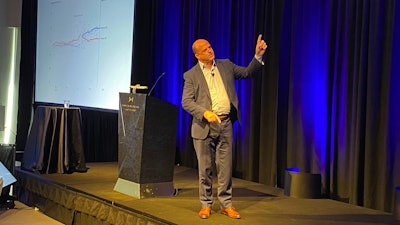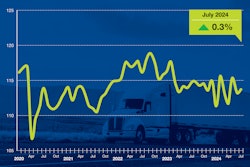
It’s election season, and in the shadow of Tuesday’s Presidential debate between former President Donald Trump and Vice President Kamala Harris, Brian Wild, chief government relations officer with the National Association of Wholesaler Distributors (NAW), shared his insights on what issues and messages are most likely to resonate with voters heading into Election Day at the Commercial Vehicle Solutions Network (CVSN) Summit Wednesday in Las Vegas.
In kicking off his remarks, Wild didn’t predict any winners nor did he share where his vote will be cast, but he did briefly touch on the previous night’s events. Wild said he felt Harris had a better debate performance because “she accomplished what she wanted to accomplish,” communicating her message to young and undecided voters. Wild said Trump’s performance wasn’t quite as strong, as he was unable to use the debate stage to “make voters hate Harris.”
Panning out, Wild wasn’t sure how much of an impact the debate will actually have on national polling. He said Harris has maintained a 2-3% lead over Trump for the last several weeks. Wild said Harris could possibly pick up a point after the debate but doesn’t see her lead growing larger because Trump’s base is so strong.
[RELATED: Register now for our upcoming webinar on bolstering your bottom line!]
But Wild also noted Harris holding a steady national lead means very little in an electoral college environment. George W. Bush in 2004 is the only Republican candidate to win the Popular vote this century but the GOP has won the White House three times.
Wild said seven states (Nevada, Arizona, Michigan, Wisconsin, Georgia, Pennsylvania and North Carolina) are the states that will decide the presidential race, with Pennsylvania being the true lynchpin.
“If [Trump] doesn’t win Pennsylvania it is almost impossible for him to win,” Wild said. For Harris, getting to 270 without Pennsylvania would be challenging but still feels possible, he added.
Wild also showed polling from The Economist, which aggregates a large number of individual polls, to show both candidates are winning three swing states and tied in Pennsylvania.
As for what happens next, Wild said the final months of the race will be about messaging. He said the lead Trump had and was widening in May and June was due to disgust about both candidates. A lower turnout election favors Trump, who has a rock solid base that will earn him 45% of the vote no matter what. Conversely, a boom in voters would likely help Harris, Wild said, which is why her campaign has focused on more positive messaging and urging people to vote.
[RELATED: Why you should view training as an investment, not an expense]
Wild’s presentation to CVSN Wednesday also touched on the Senate and House races, and the impact politics are having on policy debate.
Wild believes it is likely the Senate will go to the GOP, with West Virginia Gov. Jim Justice flipping Sen. Joe Manchin’s seat and current Democratic incumbent Sen. Jon Tester trailing against challenger Tim Sheehy in Montana. In the House, Wild agreed with the general theory that whoever wins the White House will take that chamber, adding the fun fact that only 16 of the 435 seats in the House are currently represented by someone whose party is different than what the district supported for president.
[RELATED: CVSN names its 2024 4 Under 40 Award winners]
Lastly, on the focus of policy, Wild said the horrific gridlock seen in Congress is creating a political climate where decisions are made by the executive branch, regulators and the courts instead of Congress. He said that needs to change but likely will not anytime soon, which is why NAW is developing programs to better interface with regulatory agencies and courts to drive policy.
Wild said CVSN and the companies in attendance also should share their voice to regulators writing policy impacting their businesses, while also remaining engaged with legislators and candidates in both parties. In a nation where trust in institutions have never been lower, small businesses still carry some esteem. Wild said industry and candidates can use that respect to push messaging and write policy that benefits the nation.











